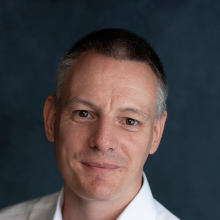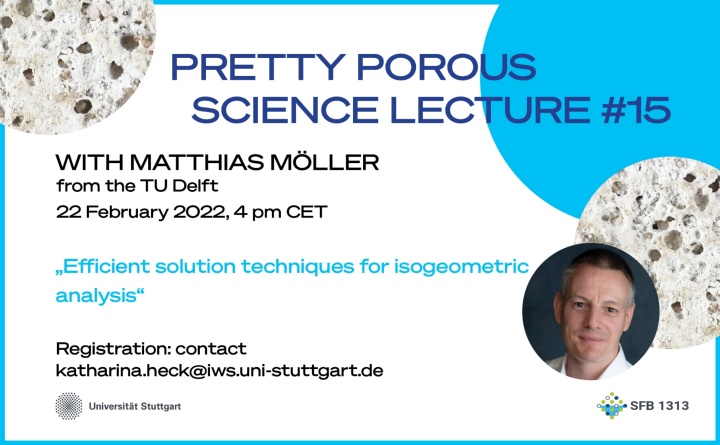We are pleased to announce that Matthias Möller, professor at the TU Delft, will give the SFB 1313 "Pretty Porous Science Lecture" #15. His talk will be on "Efficient solution techniques for isogeometric analysis".
Date: Tuesday, 22 February 2022
Time: 4:00 pm CET
Speaker: Prof. Matthias Möller, TU Delft
Lecture title: "Efficient solution techniques for isogeometric analysis"
Place: If you are interested in participating in the lecture, please contact katharina.heck@iws.uni-stuttgart.de
Abstract
Over the last decade, Isogeometric Analysis (IGA) has seen many successful applications in computational mechanics and fluid dynamics and has become an established alternative to the finite element method (FEM). While IGA is particularly good at treating complex geometries and PDE problems that call for basis functions with higher continuity, isogeometric methods also have their downsides, one being the excessive growth of the condition number of the system matrices which makes the design of efficient solvers a challenging task.
After a brief introduction into IGA, I will present an efficient p-multigrid approach for IGA discretizations. The core idea is to first perform coarsening in the spline degree p and apply an h-multigrid method to solve the residual equation on the coarsest p-level afterwards. As it is known that the performance of classical smoothers like Gauss–Seidel being applied in the context of IGA deteriorates as the spline degree p increases, we perform (block-)ILUT smoothing which leads to a solution algorithm that is robust in h and p, and in the number of patches in a multi-patch IGA formulation.
The second part of the talk will discuss a recent extension to transient problems by combining our p-multigrid approach with a multigrid-reduction-in-time (MGRIT) method to enable parallelization over the temporal dimension. Here, the core idea is to successively coarsen in the temporal direction, solve the intermediate space-time slabs in parallel and synchronize them on the coarsest temporal level with the aid of a sequentially performed time integrator.
Besides a brief theoretical analysis of the interplay of the various multigrid components, the talk will mainly focus on the computational efficiency and parallel scalability of the proposed solution approach.
About Matthias Möller
Matthias Möller is Associate Professor in the Department of Applied Mathematics section Numerical Analysis at TU Delft. He is working in the interdisciplinary field of Computational Science and Engineering (CSE), which brings together applied mathematics, computer sciences, and engineering disciplines to solve challenging real-world problems.
Matthias Möller's main research interests are finite element methods and isogeometric analysis for computational fluid dynamic problems with particular emphasis on high-resolution adaptive schemes for compressible flows and transport problems as well as fast solvers. Since recently he is working in the field of hybrid mesh-particle methods with special emphasis on the material point method, which could be extended towards higher-order approximations by using ideas from isogeometric analysis. Beside the development and analysis of numerical schemes Matthias Möller is also interested in their efficient implementation on heterogeneous multi- and manycore systems and accelerators. His interest in future computing technologies led him to start research on quantum computing and, in particular, on quantum-accelerated numerical linear algebra with the focus on developing quantum solutions for practical applications.



